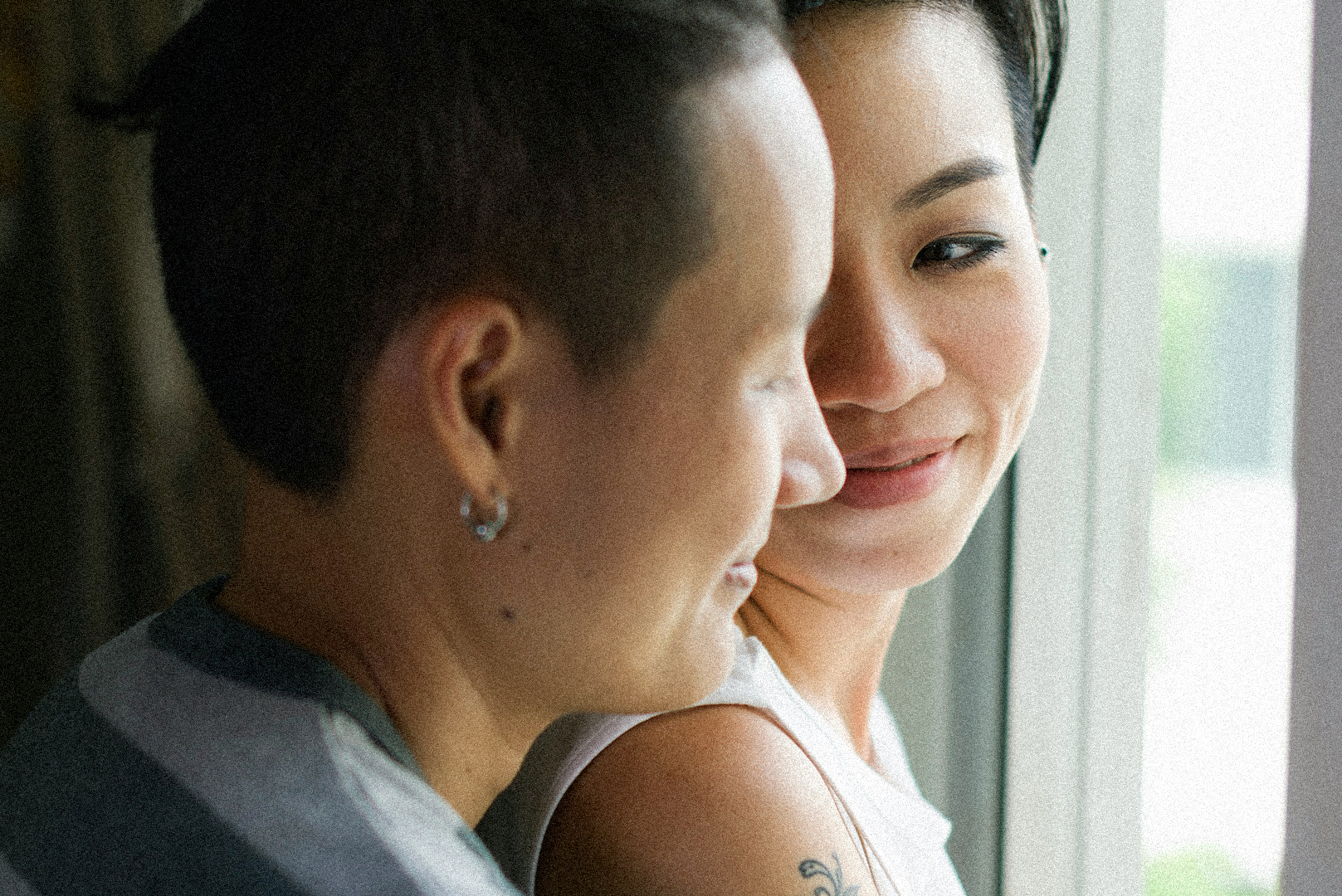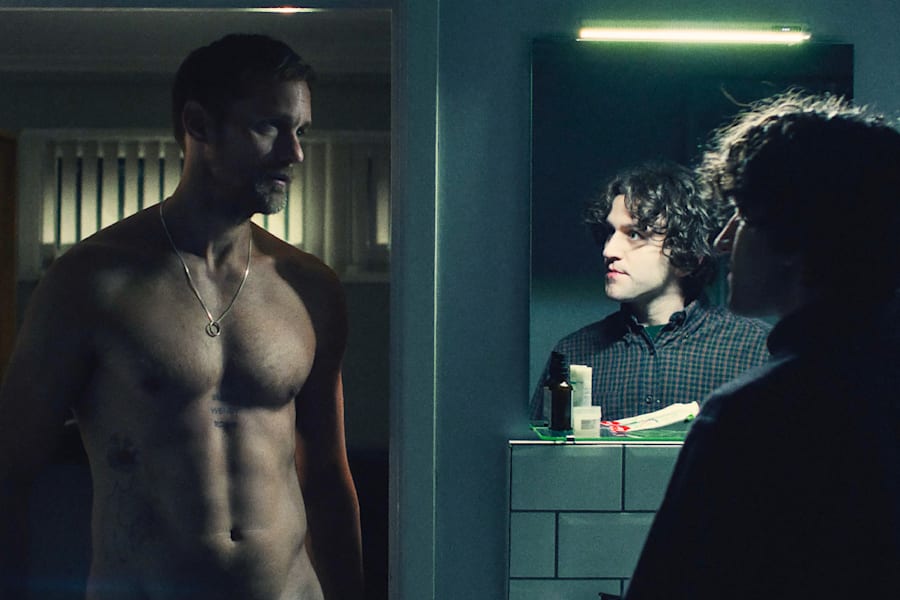Aftercare for new relationships: Building trust and communication post-intimacy

You may have heard the term "aftercare" in the context of kink or BDSM, or seen it pop up in a bio on Feeld. But what does it mean, and how can it help you to build trust in the early stages of a romantic dynamic or connection?
First things first: Aftercare refers to the emotional and physical care partners offer each other following an intimate or vulnerable experience, like having sex. In regular connections or long-term relationships, it may already be part of the rhythm. But in new dynamics, it's often overlooked or misunderstood. Is it too soon to ask how someone's feeling? Will offering comfort come off as too intense? How can you ask for what you need without feeling awkward?
The truth is, aftercare isn't just for established couples, or for kink dynamics. It's a meaningful way to build trust and deepen communication, in any relationship or connection, no matter how serious, casual, new, or fluid.
What is aftercare, and why is it important?
Aftercare is the practice of tending to each other's emotional and physical needs after intimacy, often in small, instinctive ways. There's no single way it has to look. For some, aftercare involves cuddling or talking things through. For others, it's a casual check-in, a moment of shared humor, or simply knowing when to give space. What matters is awareness. And you might already be doing it without realizing.
While the idea of aftercare is often linked to kink or BDSM scenes, its value goes far beyond those contexts. Any kind of sex or intimacy can bring up unexpected emotions. When you're exploring a new connection, building trust, and figuring each other out, intimacy isn’t just about sex itself, but about how you show up for each other before, during, and after.
Why is aftercare helpful post-sex?
Sex can stir up a broad spectrum of emotions such as connection, pleasure, vulnerability, and even uncertainty. This is especially true in newer relationships, where intimacy may still feel exciting, unfamiliar, or undefined. In these moments, what happens after sex can carry just as much emotional weight as what came before.
Many folks will be familiar with feelings of vulnerability, or desiring connection, after sex. However, for others, there can be heavier emotions at play—known as post-coital dysphoria (a sudden feeling of sadness, tearfulness, or irritability after a sexual experience). A 2019 study published in the National Library of Medicine found that 40% of men sampled had experienced the phenomenon. In a similar women-focused study published by the same library, 46% of the participants reported experiencing PCD.
When those feelings remain unspoken, they can chip away at how connected you feel, both sexually and emotionally. That’s where aftercare really matters. Whether it’s a quick check-in, a shared laugh, or just lying quietly side by side, those small gestures can go a long way. You don’t have to say anything profound; sometimes just being there is enough.
Research also shows that expressions of affection after sex, like compliments, cuddling, or gratitude, are strongly associated with higher levels of satisfaction. One study published by Taylor & Francis found that the more time couples spent engaging in shared, meaningful post-sex rituals—whether emotional or playful—the more fulfilled they felt, regardless of the relationship's length, context, or structure.
Ultimately, aftercare is less about what's done, and more about how it's offered. It invites everyone involved to feel seen, and considered.
The emotional impact of aftercare in new relationships
New connections come with a lot of feelings—excitement, curiosity, maybe a bit of nervousness. When you add physical intimacy into the mix, those emotions can get even stronger, and sometimes it's hard to know what to expect.
Emotional aftercare doesn't have to be big or complicated. It could be checking in with a simple "How are you feeling?", sending a sweet message the next day, or just being warm and present. Those small moments can make a big difference in building emotional safety, especially when you're still getting to know each other.
Aftercare also sets the vibe for your connection. When someone feels truly seen and cared for after being intimate, it builds trust. It shows that the closeness you share is handled with respect, and that you're paying attention, not just to the moment itself, but to each other.
In non-monogamous relationships, aftercare might look a little different. When there are multiple connections in the mix, it helps to communicate clearly, manage expectations, and check in in ways that feel good for everyone involved. Emotional support might mean making space for feelings like compersion or jealousy, while physical aftercare can vary depending on the vibe of each connection.
But regardless of the dynamic you have, it’s not uncommon for intimacy to stir up some unexpected emotions, especially for those still unpacking the messages they've grown up with around sex. Gigi Engle, a certified sex and relationships psychotherapist and author of Kink Curious, writes: "While sex is not shameful and should be enjoyed (safely) by one and all, it can sometimes bring up feelings of shame due to the sex-negative messages many of us faced growing up. While the logical mind tells us that sex is normal and healthy, our subconscious can store these shameful messages." Aftercare offers a chance to gently counteract that internal conflict, helping each person feel validated and at ease in their experience.
Physical aftercare: Why it’s equally important
Aftercare isn’t just about emotional check-ins; it’s physical, too. Our bodies go through a lot during sex. You might feel tender, overstimulated, or just a little worn out, especially after rougher or more intense sessions, or if you’re playing with and pleasing multiple partners.
This might look like cuddling to decompress, offering a warm blanket, helping with a gentle massage, or making sure your partner hydrates. It can also mean helping each other clean up—whether that's grabbing a towel, showering together, or simply making sure everyone has time and space to do their own thing.
Physical aftercare acknowledges the full-body nature of intimacy, deepening the feeling of safety and connection.

Common misconceptions about aftercare
Even though aftercare plays a role in emotional connection, it’s often overlooked or misunderstood—especially when some folks focus more on foreplay. Let’s break down a few of the most common myths, and why they don’t quite hold up.
"Aftercare is only for kinky or BDSM sex"
Because it's often linked to BDSM dynamics—where scenes can be physically and emotionally intense—aftercare is sometimes viewed as something reserved for kink. But, the truth is: aftercare can benefit anyone, regardless of what kind of sex they're having. Whether the experience was gentle, rough, exploratory, or familiar, the need to feel grounded, cared for, and emotionally safe afterward is universal.
"Aftercare is just for women"
It's a common assumption that emotional support after sex is something women primarily seek. But plenty of men have shared just how important aftercare is to them, too. One male Reddit user wrote: "Every time aftercare or foreplay is mentioned as crucial for the woman, I want to shout that I'm the one that wants that."
Another Reddit user shared: "Sometimes if we're having a quickie, I don't need much—just a quick kiss and a thank you. But man, for those long romantic sessions that wear us out… the cuddling, the kissing, the sweet talk, the snacks and water—it just means the world to me."
What’s more, studies on post-coital dysphoria (PCD) show that emotional vulnerability affects all genders. As we mentioned earlier, nearly 40% of men and 46% of women have experienced PCD at some point in their lives. Emotional processing after intimacy is a human need, not a gendered one.
"Aftercare is only for relationships."
Another myth is that aftercare is reserved for those in long-term, committed partnerships, but that's not true at all. Whether you've just met someone, or navigating the early stages of dating, or exploring a new dynamic with someone you've known for a while, or being intimate with multiple people, offering care after sex is a way to ensure mutual respect and well-being.
As Gigi Engle writes: "It doesn't matter if you're friends with benefits, in a long-term relationship, a one-night stand, or married—aftercare is still important. It's not about making someone fall in love with you or trying to make a more serious relationship out of something casual. It's about making sure everyone is cared for with respect and tenderness so that they can leave a sexual experience feeling good about themselves."
How to practice aftercare in new relationships
So, how do you do aftercare in a new relationship, without making it feel forced or overly formal?
Start by tuning in. After intimacy, pay attention to how you and your partner(s) are feeling, physically and emotionally. Everyone processes sex and intimacy differently, so take the time to get to know what feels good for you and for them. If you’re not sure, don’t assume or guess; simply ask them.
For example, emotional aftercare might look like…
- Asking a gentle "How are you feeling?”
- Sharing something you appreciated about the experience
- Reassuring or validating any emotions that might come up
- Following up with a message the next day to show continued care
Physical aftercare might include…
- Offering them a drink, a snack, or help cleaning up
- Cuddling, holding hands, or simply staying close
- Creating opportunity for quiet, restful time together
- Respectfully giving someone space, if that's what they need
If there's something that would help you feel better after sex, it's important to say so. Your partner(s) can't meet needs they don't know about. The more clearly you can communicate what aftercare looks like for you, the more likely you are to leave the experience feeling seen and supported.
Your aftercare preferences might not align (and that’s perfectly normal!). There may be some compromise involved, but if someone responds negatively to your boundaries or what you need, that’s a red flag.
The role of communication in aftercare
Aftercare isn't one-size-fits-all, and that's exactly why communication is so important. What feels good for one person might feel overwhelming or unnecessary to another. The key is talking about it.
Open, honest conversations can help you understand what support looks like for you and your partner(s) after sex. That might mean discussing how you tend to feel emotionally, what kind of physical closeness you prefer, and establishing boundaries.
These exchanges don't have to be heavy. They can happen before sex, during a moment of closeness, or even in a lighthearted way. The point is to get comfortable expressing what you need, and listening when your partner does the same.
To quote Kristine D'Angelo, a certified sex coach and clinical sexologist: "If you know there is something after sex that would make you feel better, then you need to speak up and ask for what you want. Your partner wants you to feel good, and anything they can do in aftercare needs to be communicated and shared with them".
We’ve got more tips in our guide to communicating aftercare needs, including how to initiate these conversations and important questions to ask.
Aftercare isn't about turning every experience into something serious. It's about recognizing that sex—whether it's casual, new, or long-term—can carry emotional and physical weight. Showing a little care in those moments after intimacy helps build trust, respect, and clarity between partners. And, especially in new relationships, that kind of connection can make all the difference. Because, sometimes, the most meaningful part of sex isn't what happens during; it's what comes after.
Want to explore how aftercare can fit naturally into your relationships? Download the Feeld app to discover more about connecting, communicating, and caring in all kinds of intimacy.


